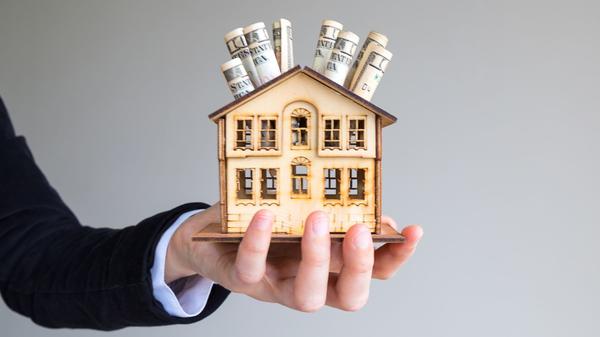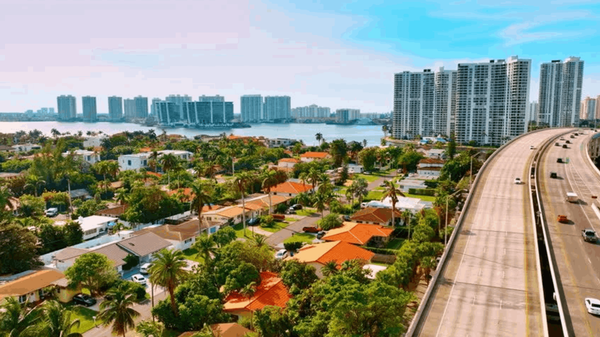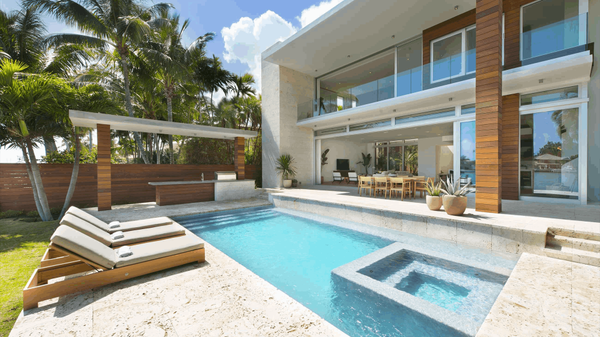7 Steps to Buying a House in New Jersey

Buying a house in New Jersey is an exciting milestone, but the process can take some time. Several factors, like your financial situation, market conditions, and the local economy can affect both how long it takes you to find a home and how much it costs you.
The more you know about the home-buying process and New Jersey's current real estate trends, the more prepared you'll be to navigate this complicated process as quickly and smoothly as possible.
No matter where you are in your home-buying journey, Clever can connect you with local real estate pros who will help you purchase your New Jersey dream home!
The best part? When you buy with a Clever real estate agent, you could earn a cash-back refund worth up to 0.5% of the home price. On a qualifying $300,000 purchase, you'd get $1,500. That's real money back in your pocket!
Step 1: Save for a down payment
Your down payment can be less than 20% of the purchase price — $94,294 for the typical home in New Jersey — but you'll have to purchase mortgage insurance and pay more interest over the life of your loan.
Your down payment is the first part of your home's purchase price that you pay at closing. Your mortgage lender will pay the remaining balance.
Typically, mortgage lenders in New Jersey want you to contribute 20% of the purchase price as a down payment. That would be $94,294 for a $471,472 home — the typical home value in New Jersey.
However, you have options to lower your down payment amount.
Government-backed loans, like VA and FHA loans, allow you to contribute 0% and 3.5% of your home's purchase price respectively. Even conventional loans allow for down payments as low as 3-5% (though the minimum varies by lender).
|
Mortgage type |
Minimum down payment (%) |
Down payment ($) |
|
VA Loan |
0% |
$0 |
|
FHA Loan |
3.5% |
$16,502 |
|
Conventional |
3% |
$14,144 |
|
Based on typical home values from Zillow (August 2022) |
||
But making a down payment of less than 20% comes with some risks.
First, because you're borrowing more money, you'll have a higher monthly payment and pay more in interest over the life of your loan.
|
Down payment |
Monthly payment |
Total interest |
Total Cost |
|
5% |
$2,526 |
$461,563 |
$933,035 |
|
20% |
$2,127 |
$388,685 |
$860,157 |
|
Based on home values from Zillow (August 2022) and a 5.44% interest rate for a 30-year loan. |
|||
Second, you may have to purchase mortgage insurance.
Conventional loans require private mortgage insurance (PMI) until your loan balance reaches 80% of the purchase price. FHA loans, on the other hand, require a mortgage insurance premium (MIP) for the life of your loans.
Mortgage insurance costs around 1% of your mortgage balance annually. However, rates vary based on your down payment and credit score. Typically, your mortgage insurance payment is added to your mortgage payment each month.
VA loans don't charge mortgage insurance. Instead, you'll pay a VA loan funding fee at closing, which can range from 1.4% to 3.6% of the purchase price.
New Jersey down payment assistance programs
The state of New Jersey offers a number of down payment assistance (DPA) programs for first-time and low-income homebuyers. These programs can provide financial aid in the form of a grant or second mortgage to help you pay for closing costs or a down payment.
Here are some options in New Jersey that you may be eligible for:
NJHMFA Down Payment Assistance Program
The New Jersey Housing and Mortgage Finance Agency (NJHMFA) offer a DPA program for first-time homebuyers and those who haven't owned a home in the past three years. Eligible participants can receive an interest-free second mortgage for up to $10,000 for a down payment or closing costs.
This program is limited to those who have an NJHMFA first mortgage and meet maximum household income limits for their county.
U.S. Department of Housing and Urban Development
Additional DPA programs and resources in New Hampshire are available on the state's HUD page.
Step 2: Get preapproved for a mortgage
Once you're preapproved for a mortgage, it's imperative that your financial situation doesn't change. If your credit drops, it can derail the process and keep you from closing on your house.
Here are some easy ways to ensure your credit doesn't change after you receive your preapproval letter:
- Avoid opening new credit accounts
- Don't close any accounts that have been open for a long time
- Make all of your credit card payments on time
A mortgage preapproval letter is an offer to lend you up to a certain amount of money to purchase a home. It shows sellers that you are a serious buyer who is financially qualified to make an offer on a home.
Most sellers in New Jersey will require preapproval before showing you their home.
You don't have to decide on one lender right now. In fact, you should compare interest rates and preapproval amounts from several lenders to make sure you're getting the absolute best terms when you buy your New Jersey home.
Get Pre-approved Today!
Get matched with a lender who can tell you how much house you can afford. To get started, where do you plan on buying?
Step 3: Choose the right location
Search for neighborhoods where:
- Home prices are within your price range
- Home values are on the rise
- The local amenities support your lifestyle
Currently, the typical home value in New Jersey is $471,472, but don't worry if that doesn't perfectly match your budget. Home prices vary dramatically from city to city and even from neighborhood to neighborhood!
Also, look at past home value trends. This will give you an idea of how much your home's value could go up over the next few years.
To give you an idea of how appreciation could impact what your house is worth in the future, consider these examples from three neighborhoods in Jersey City:
Home value appreciation in Jersey City
|
Neighborhood |
2015 |
Current |
Appreciation |
|
The Heights |
$354,342 |
$676,649 |
47.6% |
|
Greenville |
$243,875 |
$496,852 |
50.9% |
|
Journal Square |
$284,249 |
$494,209 |
42.5% |
Step 4: Start house hunting in New Jersey
Listing prices have barely risen in the past year, so homes in New Jersey will probably be within your budget. However, inventory is dipping, so there may not be a lot to choose from. You may have to settle on a home that won’t check all your boxes. Be open to the listings your agent shows you, even if they’re not exactly what you initially wanted. You may just be surprised and find one that’s worth considering.
Searching for homes in New Jersey is the fun part of the home-buying process! You'll get to look at a variety of homes and discover what you really want in a home.
Make a list of everything you want in a home and prioritize them. At the top of the list should be the items that are most important to you. This will help you separate your "must-haves" from your "nice-to-haves."
Your agent can help you understand if your wants are realistic for your budget and favorite neighborhoods or if you need to rethink what you're looking for.
Look at current housing inventory
The timing of your house hunt in New Jersey can have a big impact on your number of options. For example, in New Jersey, May has historically seen the most homes for sale. Searching in this season could give you more options and a greater likelihood of finding your dream home.
On the other hand, December gives you the fewest choices in New Jersey. Historically, there are 47.8% fewer homes for sale than during New Jersey's peak season.
Housing inventory in New Jersey by season
|
Season |
New listings per month |
|
Spring |
16,128 |
|
Summer |
16,128 |
|
Fall |
16,128 |
|
Winter |
16,128 |
|
Based on data from Realtor.com (September 2022) |
|
Step 5: Make an offer
New Jersey’s market is very active — homes are selling fast and very few listings are left on the market at the end of each month. When you find a house you love, you will have to make an offer fast, possibly even on the same day as the viewing. Besides that, given the fierce competition, you will also have to put in a very strong offer to get the seller’s interest. Get your agent’s help when you write your offer, as they can ensure that you give a figure that’s competitive but fair for you.
Once you find a New Jersey house you love, it's time to make an offer. Your real estate agent will help you write a compelling offer that gives you the best shot of convincing the homeowner to sell to you.
Currently, in New Jersey, homes stay on the market for 61 days before going under contract. However, every market goes through seasonal changes. During busier months, homes get snatched up more quickly than others.
Historically, New Jersey homes sell fastest in June, where the average property is only on the market for 50 days. If your home search falls around this time, you should be prepared to move quickly and potentially make offers on several homes before yours is accepted.
On the other hand, if you buy in December, you have a bit more time to search. Homes typically stay on the market 20 days longer than New Jersey's annual average.
Average time homes spend on the market in New Jersey
|
Annual average |
61 days |
|
January |
80 days |
|
February |
65 days |
|
March |
50 days |
|
April |
48 days |
|
May |
49 days |
|
June |
49 days |
|
July |
51 days |
|
August |
58 days |
|
September |
61 days |
|
October |
64 days |
|
November |
66 days |
|
December |
76 days |
|
Based on data from Realtor.com (September 2022) |
|
Step 6: Inspections and appraisals
Inspections and appraisals are an opportunity for you to better evaluate the home's condition and value before officially purchasing it. You may have an opportunity after this step to renegotiate the terms of your contract with the seller if something unexpected pops up.
Home inspections in New Jersey
Having your New Jersey home inspected by a licensed inspector gives you peace of mind about the condition of the property before you commit thousands of dollars to purchase it.
Your inspector should check out the following parts of the property:
- Roof
- Foundation
- Electrical system
- HVAC system
- Plumbing
If the home has a septic system, you should also pay for a septic inspection to make sure it doesn't have any problems that wouldn't be covered in a typical home inspection.
New Jersey-specific inspections
New Jersey’s disclosure laws require sellers to divulge any known issues to interested buyers before closing. However, buyers still need to take necessary precautions to ensure that there aren't any hidden problems with a property.
In addition to a general home inspection, buyers are recommended to complete more specialized tests, such as:
- Radon testing: Radon is one of the leading causes of lung cancer, and it can enter a home without detection. If the seller hasn't performed a radon test in the past year, consider having a test done before closing.
- Pest inspection: Some lenders require borrowers to have a termite and pest inspection completed, but buyers should consider getting one done regardless. Infestations can spread without warning and cause structural damage to a property, so early detection is vital.
- Appraisals
Appraisals determine the value of the property. If you're using a mortgage to buy your new home, your lender will order an appraisal to make sure the home is worth the money that it's loaning you.
Step 7: Close on your new home!
On closing day, you'll meet at the title company to complete the transfer of your New Jersey home. Plan to spend a few hours completing some legal paperwork and settling your closing costs.
It's recommended to carefully review your paperwork ahead of time, if possible. The documents need to be completed perfectly for a legal transfer, so it's important that you fully understand each page before signing.
Some important documents to keep an eye out for will include: - Your final loan application
- The deed
- The mortgage promissory note
- The disclosure statements
- Once the paperwork is finished, you’ll be asked to pay your closing costs. The title company will make this easy by collecting the total sum you owe and distributing the correct amounts to every recipient on your behalf.
As a buyer, you can think of your closing costs being separated into four categories: - Lender fees: Fees paid to your mortgage lender for originating and underwriting your loan. Sometimes, lender fees may cover additional costs associated with your loan, such as appraisal fees and survey fees.
- Title and escrow charges: Fees that the title company charges for their services. These fees are for conducting the closing process, performing the title search, and providing title documentation.
- Prepaid costs: Ongoing homeownership costs that are paid up front. Lenders sometimes require borrowers to pay certain expenses ahead of time, such as property taxes and homeowners insurance.
- Other closing costs: Miscellaneous expenses that vary by homebuyer. Common expenses covered here can include natural disaster certification fees or real estate attorney fees.
- Buyers in New Jersey typically pay 3–5% of the purchase price in closing costs. For a $471,500 home — the typical home value in New Jersey — that's between $14,145 and $23,575!
Categories
Recent Posts











